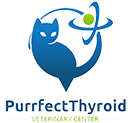What is Hyperthyroidism?
Hyperthyroidism, also known as “hyperthyroid disease,” occurs when the thyroid gland enlarges, and starts producing excess amounts of thyroid hormone (thyrotoxicosis). This anomaly is usually caused by a benign tumor on one or both of the thyroid gland’s lobes. Although thyroid tumors can be cancerous, the chances are only 2% to 5% of malignancy.
What are the Symptoms?
Not all symptoms will be seen in every cat with hyperthyroidism, but any one or two of them should be a strong indication that a veterinary examination is indicated. Some or all of the following symptoms may be present in a hyperthyroid cat:
- Increased Appetite
- Unexplained Weight Loss and loss of muscle mass
- Irritability or Nervousness
- Frequent Vomiting
- Unkempt-looking Coat
- Diarrhea
- Excessive Thirst (polydipsia)
- Weakness
- Lethargy
How is Hyperthyroidism Diagnosed?
Physical Exam: The veterinarian will palpate the cat’s neck area, and may feel the enlarged gland(s). Heart rate and blood pressure will also be checked.
Blood Work: Since hyperthyroidism can mimic the symptoms of other diseases, such as chronic kidney failure or liver disease, a blood panel will usually show the “big picture,” when combined with a thyroid-specific test, usually the T4, which will show thyroid levels. Elevated levels of T4 will usually strongly indicate the presence of hyperthyroidism. However, some older cats may fall within the “normal” range, and still have the disease. When in doubt, other thyroid screening tests can be give. As hyperthyroid disease can predispose to other conditions, such as kidney disease or hypertension, the blood panel will also reveal pertinent information on the kidney and other organs. This is essential to know prior to choosing an appropriate treatment.
How is Hyperthyroidism Treated?
There are three standard treatment options available. Each offers a strong possibility of returning the thyroid gland to normal function. The advantages and disadvantages of available therapies are discussed below
Radioiodine Treatment
This has become the “Gold Standard” of therapy in appropriate candidates. A single injection of radioactive iodine (I-131) is given under the skin (similar to a routine vaccination). The Iodine is selectively taken up by the thyroid tissue and destroys it. No harm is done to normal tissue. The cat must remain in the veterinary hospital for an average of 5-7 days until his radioactive levels are acceptable.
Advantages:
- Provides a permanent cure in 95-97% of cases.
- Safe
- Minimizes stress to the cat.
- No serious side effects
- Requires no further medicating in the vast majority of cases
Disdvantages:
Intitial cost is higher, but is equal to about 12-18 months of care with the oral medication and appropriate visits
The subsequent development of hypothyroidism is a possibility (about 2.5% of cases), but it can be treated with thyroid supplementation.
Anti-Thyroid Medication
Methimazole (Tapazole) is an oral medication that must be given twice daily for the rest of your pet’s life.
Many cats do quite well on methimazole, however, for pets that have side effects, they can be quite severe. It also requires regular blood tests to monitor hormone levels, so dosage can be regulated.
- Non-Invasive
- Relatively inexpensive, initially
Disdvantages:
- Side effects occur in some cats, including vomiting, anorexia, fever, anemia, and lethargy. More serious side effects from long-term use may include liver damage and bone marrow suppression.
- Frequent veterinary follow-up is needed.
- The medication does not affect the tumor, but will keep the disease in remission.
- Some cats (and/or owners) cannot handle twice-daily pilling, and the attendant stress can exacerbate other physical problems.
Surgery
Surgery can be an effective treatment. Surgery is most often indicated when only one thyroid lobe is involved. A radionuclide scan is indicated prior to the surgery to determine the extent of the diseased thyroid tissue, and to locate any extraneous thyroid tissue growing elsewhere in the neck (or chest) of the cat, which may contraindicate surgery.
Because hypertrophic cardiomyopathy is sometimes present, a full workup is required to eliminate this potentially dangerous condition. Also, the cat must continue on anti-thyroid medication for 15 days prior to the surgery, so that renal function can be retested. Hyperthyroidism can cloak underlying renal disease, and the medication will return thyroid hormones to a normal level, which will allow existing kidney failure to be revealed.
A cat with heart disease or kidney disease is NOT a candidate for surgery.
Advantages:
- Eliminates the need for long-term medication
- Favored where Radioiodine is not available
Disdvantages:
- Possible damage to the adjacent parathyroid gland
- If both glands are involved, a second surgery is necessary.
- Hazards of anesthesia
- If only one lobe is removed, a recurrence is possible.
- Possible development of hypothyroidism.(Can be treated with thyroid supplements).

